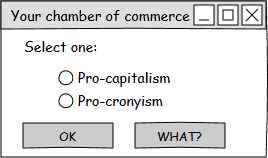Does the Wichita Metro Chamber of Commerce support free markets, capitalism, and economic freedom, or something else?
 Very often, local chambers of commerce support crony capitalism instead of pro-growth policies that allow free enterprise and genuine capitalism to flourish.
Very often, local chambers of commerce support crony capitalism instead of pro-growth policies that allow free enterprise and genuine capitalism to flourish.
We saw this in Wichita this year, where the Wichita Metro Chamber of Commerce campaigned for a sales tax increase. The Chamber recommended that Wichitans vote in favor of a sales tax of one cent per dollar, with some of the proceeds to be dedicated for a jobs fund. (Other uses were to be for a new water supply, expanded bus transit, and accelerated neighborhood street repair.) Chamber leaders told the Wichita city council that if the jobs fund was not included in the package presented to voters, the Chamber would not support the sales tax.
Not long ago the Wichita Chamber was opposed to higher sales taxes. In March 2010, as chair of the Wichita Chamber, Sam Williams submitted a letter to the Wichita Eagle in which he wrote “Tax increases and government spending will not create employment or revive the state’s economic engine. Increasing the costs of goods and services will only lead to fewer purchases, more business closures, higher unemployment and less taxes being paid.”
In April of same year, he wrote again to the Eagle, advising Wichitans this: “Simply put, raising taxes hurts business, costs jobs and ultimately leads to fewer taxpayers and fewer taxes being paid to fund state and local government.”
Having espoused these anti-tax sentiments just four years ago, it’s curious that the Wichita Chamber would support and campaign for a sales tax for Wichita this year. This spills over to mayoral politics. As far as I saw, Sam Williams, — the Chamber’s chair in 2010 — did not take a public position on the sales tax this year. Except for this: Williams is chair of the Wichita Downtown Development Corporation, and that organization endorsed the sales tax.
Regarding mayoral politics: Did you know that Sam Williams is running for mayor? And that it appears he has the support of the Wichita Chamber?
I have a request. If you see Sam Williams, would you ask him about his position on raising sales taxes?
Your chamber of commerce
Most people probably think that local chambers of commerce — since their membership is mostly business firms — support pro-growth policies that embrace limited government and free markets. But that’s usually not the case. Here, in an excerpt from his article “Tax Chambers” economist Stephen Moore explains:
The Chamber of Commerce, long a supporter of limited government and low taxes, was part of the coalition backing the Reagan revolution in the 1980s. On the national level, the organization still follows a pro-growth agenda — but thanks to an astonishing political transformation, many chambers of commerce on the state and local level have been abandoning these goals. They’re becoming, in effect, lobbyists for big government.
…
In as many as half the states, state taxpayer organizations, free market think tanks and small business leaders now complain bitterly that, on a wide range of issues, chambers of commerce deploy their financial resources and lobbying clout to expand the taxing, spending and regulatory authorities of government. This behavior, they note, erodes the very pro-growth climate necessary for businesses — at least those not connected at the hip with government — to prosper. Journalist Tim Carney agrees: All too often, he notes in his recent book, “Rip-Off,” “state and local chambers have become corrupted by the lure of big dollar corporate welfare schemes.”
…
In the states, chambers have come to believe their primary function is to secure tax financing for sports stadiums, convention centers, high-tech research institutes and transit boondoggles. Some local chambers have reportedly asked local utilities, school administrators and even politicians to join; others have opened membership to arts councils, museums, civic associations and other “tax eater” entities.
…
“I used to think that public employee unions like the NEA were the main enemy in the struggle for limited government, competition and private sector solutions,” says Mr. Caldera of the Independence Institute. “I was wrong. Our biggest adversary is the special interest business cartel that labels itself ‘the business community’ and its political machine run by chambers and other industry associations.”
From Stephen Moore in the article “Tax Chambers” published in The Wall Street Journal February 10, 2007. The full article can be found here.
Leave a Reply